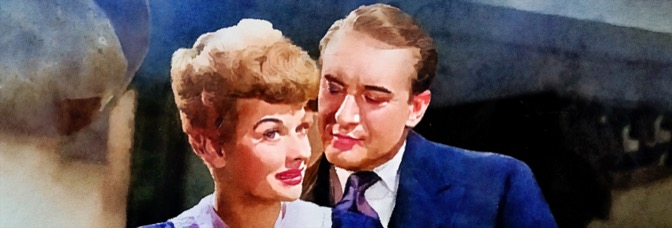If Lured had gone just a little bit differently, it could’ve kicked off a franchise for Lucille Ball and George Sanders. He’s the high society snob, she’s the New York girl in London, they solve mysteries. But Lured isn’t their detective story; it’s Charles Coburn’s detective story, they’re just the guest stars. Coburn’s a Scotland Yard inspector who has all the latest science—there’s a time-killing typewritten letter analysis sequence at beginning—but isn’t any closer to finding a probable serial killer. Even though the police haven’t found any bodies, they’ve gotten corresponding missing persons from right when they get these creepy poems sent into them.
Ball comes into the story because she’s friends with the latest victim. She and the friend were taxi dancers (Ball had come to London in a show, it closed almost immediately), but the friend was going off with some guy she met in the personals. Coburn—in an adorable and out-of-place (Lured’s got a certain light tone to the danger, but it’s not established by then) scene—recruits Ball to the police force to work undercover as bait. Because if you’re going to buy into Georgian Charles Coburn as a Scotland Yard inspector, you’re going to buy him recruiting Ball to be bait. And of course Ball is going to go for it because she’s scrappy.
So the movie’s gone from Coburn to Ball. Top-billed George Sanders has been introduced separately, as a nightclub owner and professional cad who’s taken a liking to scrappy Ball. Sight unseen. The scrappiness. Sanders has some truly adorable moments in the film, which unfortunately don’t last, but when he moons over Ball’s voice to business partner and best pal Cedric Hardwicke, it’s fantastic. Especially since when Ball and Sanders finally do get together, they’re great. They run out of moments way too quickly, as the film then shifts—middle of the second act—back to Coburn and the police investigation. Both Sanders and Ball almost entirely disappear from the action—even if it makes sense for Sanders, it makes zero sense for Ball (especially since the shift comes right after she’s ostensibly in grave danger)—and instead its cat and mouse between Coburn and his prime suspect. Lured has a protracted scene confirming the audience’s suspicions with Coburn’s. Even though Coburn’s always likable, he’s not really able to carry full scenes on his own. Having Ball come into the movie and give him someone to play off, then the scenes work, because there’s enough energy. But when he’s having wordy showdowns? Eh. It’s like Lured’s already forgotten its had Boris Karloff in a wonderfully goofy (but still dangerous) sequence. Like director Sirk and screenwriter Leo Rosten didn’t know how to pace out their action set pieces. They have all the energetic ones early, with the finales being a little too perfunctory.
It still works out pretty well because Ball’s great, Sanders is great, Coburn’s always likable, and Sirk and his crew do some fine work. The Michel Michelet score often tries to do a little too much, but it’s a fine score. It wouldn’t be doing too much if Sirk hadn’t left too much room. The storytelling is sporadic and needs a cohesive narrative tone to compensate, something to give the de facto vignettes… some, I don’t know, rhythm. Sirk doesn’t have any tonal rhythm. So the music fills in and sometimes a little too loudly.
Great photography from William H. Daniels.
Many of the performances are outstanding. Ball, Sanders, Karloff; George Zucco as Ball’s guardian angel and a recurring narrative element Sirk also doesn’t do quite right. Joseph Calleia, Alan Mowbray; they’re both good with potential for more (but not in it enough). Coburn’s good. Hardwicke’s all right but the part’s not great. With Coburn and Hardwicke, for different reasons, maybe the problem is the script. Or, just with Coburn, maybe the problem is he’s kind of stunt casting only without there being any followthrough. For Lured to excel, it either needed great performances in Coburn and Hardwicke’s parts or it needed to emphasize Ball and Sanders’s chemistry. It does neither.
Instead, it’s a near success, with some great acting and some excellent filmmaking.

Leave a Reply